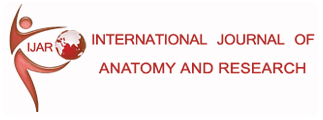IJAR.2017.402
Type of Article: Original Research
Volume 5; Issue 4.2 (November 2017)
Page No.: 4585-4589
DOI: https://dx.doi.org/10.16965/ijar.2017.402
ROLE OF TUMOUR SUPPRESSOR GENE P53 IN TRIPLE NEGATIVE BREAST CANCER
Priya S Patil *1, Jaydeep N Pol 2, Ashalata D Patil 3.
*1 Associate Professor, Bharati Vidyapeeth Deemed University Medical College & Hospital, Sangli, Maharashtra, India.
2 Consultant Pathologist, Mahatma Gandhi Oncopathology Center, Miraj, Maharashtra, India.
3 Professor, Department of Anatomy, DY Patil Medical College, Kolhapur, Maharashtra, India.
Address for Correspondence: Dr. Priya S Patil, Associate Professor, Bharati Vidyapeeth Deemed University Medical College & Hospital, Sangli, Maharashtra, India. E-Mail: drpriyapatil22@gmail.com
ABSTRACT
Background: Cancer is a rapidly growing health problem in both developed and developing countries. In the diagnosis and prognosis of breast cancer tumour markers are routinely used. However 10-20% of breast cancers test negative for hormone receptors [ER, PR] as well as HER2 and are labelled as Triple-negative breast cancers (TNBC). TNBCs’ show a higher histological grade, metastasize and recur after treatment with lower five-year survival rates. Cancer genetics is the study of oncogenes and tumour suppressor genes. The tumour suppressor gene p53 called as the guardian of the genome plays its own role in such cancers. When mutation occurs in p53 it affects multiple oncogenic processes. Current study focuses on triple negative breast cancers and the study of cancer critical tumour suppressor gene p53 in TNBC by immunohistochemistry.
Materials and Methods: In collaboration with oncopathology center the study was conducted in the department of Anatomy for a period of two years. All the cases of carcinoma breast were included and retrospectively reviewed for histological grade, hormone and HER2 status. The TNBCs’ were stained further for p53 by Immunohistochemistry in the department of Anatomy.
Results and Conclusion: In the current study the incidence of TNBCs’ was 23 %. Out of total TNBCs’ 27 % were p53 positive and all of them were diagnosed at an earlier age. The histological grade of all p53 positive TNBCs’ was grade III which showed statistical significance. The p53 positive TNBCs’ definitely need aggressive treatment with close follow up.
Key words: Tumour suppressor gene p53, triple negative breast cancers, TNBC.
REFERENCES
- Bruce Alberts, Alexander Johnson, Julian Lewis, Martin Raff, Kith Roberts, Peter Walter. Cancer, in Molecular Biology of the Cell 5thedn: USA; Garland Science, Taylor and Francis group, 2008:234-50.
- Daniel Dang, Yang Peng. Roles of p53 and p6 in triple- negative breast cancer. Breast Cancer Manage 2013;2(6):537-544.
- Lane DP: P53; Guardian of the genome. Nature 358:1992,p:15-16.
- Milena Gasco,Shukri Shami, Tim Crook. Review: The p53 pathway in breast cancer. Breast Cancer Res, 2002;4:70-76.
- Walerych D, Napoli M, Collavin L, Del Sal G. The rebel angel: mutant p53 as the driving oncogene in breast cancer. Carcinogenesis. 2012 Nov;33(11):2007-17.
- Patricia A.J. Muller, Karen H. Vousden. Mutant p53 in Cancer: New Functions and Therapeutic Opportunities. Cancer Cell. 2014 Mar 17;25(3):304–317.
- Oliver M etal.The clinical value of somatic TP53 gene mutations in 1,794 patients with breast cancer. Clin.Cancer Res.,12:1157-67.
- Franca Podoa, Lutgarde M.C. Buydensb , HadassaDeganic , RietHilhorstd , EddaKlippe , Ingrid S. Gribbestadf , et al.Review Triple-negative breast cancer: Present challenges and new perspectives. Molecular Oncology,2010;4:209 -229.
- Naoise C Synnott, Alyson M. Murray, Norma O’Donovan, John Crown and Michael J. Duffy. Mutant p53 as a therapeutic target for the treatment of triple-negative breast cancer: Prelinical investigation with the anti-p53 drug, APR-246. Journal of Clinical Oncology,2016;34(15):1082.
- Yang, C.W.Du, M Kwan, S X Liang, G J Zhang. The impact of p53 in predicting clinical outcome of breast cancer patients with visceral metastasis. Scientific Reports,2013;3:1-6.
- Jeremy M.R. Lambert, PetrGorzov, Dimitry B. Veprintsev, MajaSöderqvist, Dan Segerbäck, Jan Bergman, Alan R. Fersht, Pierre Hainaut, Klas G. Wiman, Vladimir J.N. Bykov. PRIMA-1 Reactivates Mutant p53 by Covalent Binding to the Core Domain. Cancer Cell 2009;15(5):376–388.








